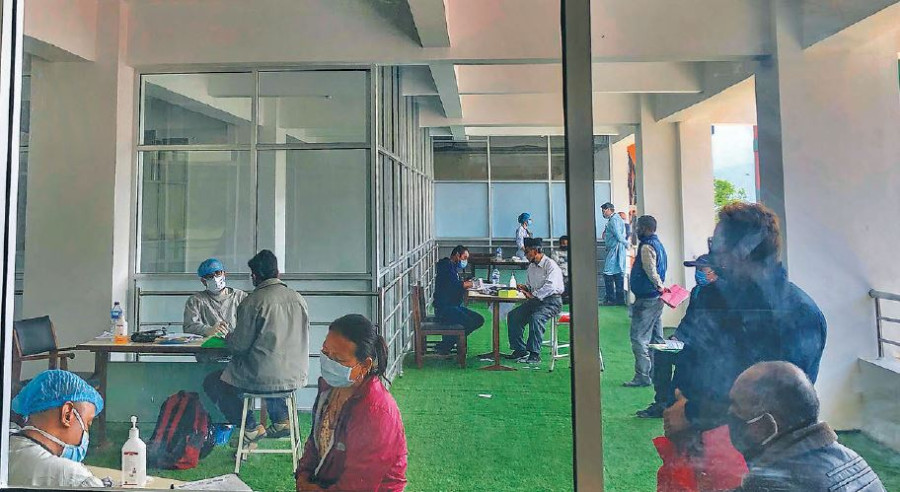Health
Hospitals are now demanding PCR test results before admitting patients
Doctors say that hospitals must balance the desire to protect their staff with the need to provide critical care to patients.
Arjun Poudel
Three weeks ago, 18-month-old Jishan Shah of Sarlahi badly injured his left foot when he came under the wheel of a moving tractor. He was immediately taken to a nearby hospital, which referred him to a Birgunj hospital, which in turn referred him to Kathmandu without attending to him. At both the hospitals, doctors demanded to see a Covid-19 test result before attending to the boy.
"In Kathmandu too, we visited several hospitals but everywhere, doctors sought a Covid-19 test report saying he didn’t have the coronavirus before admitting him," Jishan's grandfather, Dilbahar Shah, told the Post.
According to Dilbahar, a rapid diagnostic test performed on Jishan at a private laboratory came back negative for Covid-19 but hospitals demanded a polymerase chain reaction (PCR) test, as they had come from a hotspot for Covid-19.
Jishan’s family tried to get him a PCR test, but there are just 20 laboratories across the country that conduct the tests and patients have to wait at least a week for the test results.
Two days after the accident, Jishan was admitted to Grande International Hospital in Kathmandu. At Grande, the management was satisfied with the rapid test results, according to Dilbahar. But doctors at the hospital have said that Jishan’s leg may need to be amputated, as the wound has gotten infected due to a lack of immediate care.
As the country is in the midst of an exponential rise in the number of Covid-19 cases, with numerous cases emerging in health institutions, many hospitals across the country have begun to demand Covid-19 test results from patients before admitting them. In many cases like Jishan’s, a rapid test does not suffice; hospitals demand a PCR test, which can be costly, time-consuming and difficult to access. For those with issues that need immediate medical attention, this requirement can be deadly.
Last week, 57-year-old Govinda Basnet of Banepa, a retired civil servant, was taken to the Civil Hospital in Kathmandu after complaining of chest pains and a fever, but the hospital refused to admit him without a Covid-19 test.
“We had taken my uncle to the Civil Hospital as the hospital provides a discount to former civil servants,” Nabaraj Basnet, his nephew, told the Post. “But the hospital refused to attend to my uncle without seeing a polymerase chain reaction test report.”
The patient was then taken to Alka Hospital, which admitted Govinda but also sought a coronavirus test report.
“It took six days to get a PCR test report,” said Nabaraj. “We had a lot of trouble getting our uncle admitted and starting treatment.”
Even state-run hospitals have been refusing to attend to patients without a Covid-19 test report.
A woman in her late 30s from Nuwakot, who was taken to the National Trauma Centre for treatment of a fractured fibula on Saturday, was denied treatment without a PCR test report. Doctors at the hospital had performed a rapid diagnostic test, which was negative, but they refused to conduct surgery without a PCR report, said doctors at Grande Hospital, which eventually admitted the woman on the basis of her rapid test results.
While hospitals may have legitimate reasons behind asking for a Covid-19 test, their desire to protect their staff from potential infection should be balanced by a dedication to attending to patients who desperately need treatment, say doctors.
“Denying care to patients who are in critical condition is inhuman and against the Hippocratic Oath,” said Dr Chakra Raj Pandey, medical director at Grande Hospital.
Pandey said that doctors need to get used to providing their services by taking precautionary measures, as the ongoing Covid-19 pandemic is not going to end anytime soon.
He also said that the PCR test reports should be provided at the earliest if it is sought by doctors for treatment.
Many hospitals are also reluctant to admit patients from Covid-19 hotspots because they lack an adequate amount of personal protective equipment. With the number of Covid-19 cases ballooning across the country, doctors and nurses, like the rest of the population, are understandably panicked, say doctors.
But according to many public health experts, the coronavirus pandemic will necessitate a change in the way Nepal’s hospitals operate.
Dr Baburam Marasini, former director of the Epidemiology and Disease Control Division, said that if health care services continue to operate like they did in the past, there is a risk of hospitals themselves turning into coronavirus hotspots.
"Online ticketing needs to begin and appointments must be strictly kept so that patients can come to hospital at the given time to see their doctors,” Marasini said.
Telemedicine services can be another option, according to Marasini, which could be effective in reducing crowds at big hospitals while also providing care to patients in remote areas who might be unable to travel.
The country itself needs to make effective use of the three tiers of health care, according to Dr Sudha Sharma, former health secretary.
“Patients should be filtered at the local, district and provincial levels, but for that to happen, all health facilities need to be strengthened and provided with infrastructure and human resource,” she said.
The practice of referring any and all serious cases to the Capital or to urban centres needs to end, limited only to those who require advanced care.
"But it is not possible to resume health care services like in the past, when patients from across the country reached big hospitals directly and had themselves examined by doctors," said Sharma.




 9.6°C Kathmandu
9.6°C Kathmandu















